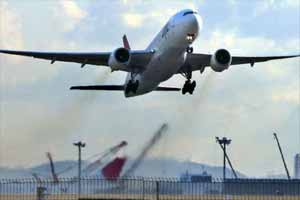Even as incumbent carriers like Jet Airways, SpiceJet, Indigo and GoAir spar with the newer ones like AirAsia and Vistara over the 5/20 rule, the government seems to have found a middle path to resolve the fight.
Top sources told FE that the view that has emerged in the higher echelons of the government is to scrap the clause requiring domestic airlines to fly overseas after completing five years of operations but retain the requirement of having 20 aircraft. This means that new carriers like AirAsia and Vistara can fly overseas without waiting for five years but need to have 20 aircraft. Currently, AirAsia, which started its operations in June 2014, has six aircraft, while Vistara, which started in January 2015, has nine. It started with seven and added two more later.
Sources said that last week home minister Rajnath Singh had chaired a meeting to discuss the new civil aviation policy, which the government wants to finalise soon. The meeting was attended by civil aviation minister Ashok Gajapathi Raju, his deputy Mahesh Sharma, road transport and highways minister Nitin Gadkari, railways minister Suresh Prabhu, defence minister Manohar Parrikar and skill development minister Rajiv Pratap Rudy.
It was at this meeting that the view emerged of taking the middle ground as it is likely to assuage both sides — incumbents and new operators — and also ensure that the new airlines maintain a balance between their domestic and foreign services.
The only hitch will be that the older airlines may still want the route dispersal guidelines also to be amended for all in the new policy.
“The 5/20 norm is likely to go and will be replaced by a rule that will ensure that domestic connectivity is not compromised after airlines are allowed to go international,” an official said.
Currently, the policy allows a carrier to fly overseas only after completion of five years of operations and if they have 20 aircraft in their fleet. The draft civil aviation policy that was floated in October 2015 had only given alternatives to seek comments from the public and other stakeholders before a stand was finalised. The options are either let it stay as it is or an unconditional abolition. The third option is a reworked domestic flying credits (DFCs) formula requiring Indian airlines to earn and maintain 300 DFCs annually to start flights to Saarc nations and countries beyond 5,000 km radius of New Delhi. They will need to accumulate 600 DFCs before starting to fly to the rest of the world.
The civil aviation ministry has roughly calculated that an airline needs five aircraft in a year to earn 300 DFCs.
The fight between the two groupings, the incumbents who are under the banner of Federation of Indian Airlines (FIA) and the newer ones like AirAsia and Vistara, intensified when on February 21 Ratan Tata said that established were using “monopolistic pressures” to retain “preferential treatment” under the 5/20 rule. The Tata Group has stakes in both AsiaAsia (41%) and Vistara (51%).
Countering Tata’s comments, the representatives of the incumbent airlines said on Tuesday that scrapping of the 5/20 rule but retaining the route dispersal guidelines (RDG) will tilt the balance in favour of the newer airlines. The RDG requires an airline to deploy around 30% of its fleet on social routes, which are unprofitable. This means that Indigo, which has a fleet size of 101 aircraft, has to deploy 30 of them on social routes. This cannot change without the government’s prior permission. Contrast this to AirAsia, which has six aircraft, and needs to deploy only two on social routes.
This is the reason incumbents want the scrapping of the 5/20 rule only if RDG is also scrapped. “If 5/20 is abolished, route dispersal guidelines should go too,” SpiceJet chairman Ajay Singh had said on Tuesday. If only 5/20 is abolished and not RDG, the way it will tilt the balance in favour of newer players was highlighted by Indigo president, Aditya Ghosh, “While an Indigo with more than 100 aircraft cannot restructure its network by withdrawing from any unprofitable routes, an airline with just five aircraft can fly abroad with the sixth one — this is not acceptable.”
The representatives of the older airlines had also charged the newer ones of violating the foreign direct investment guidelines for the sector by vesting substantial ownership and control in the hands of their foreign partners. A Tata Sons statement on Wednesday strongly refuted such a charge while also countering the stand of the older airlines on 5/20.
“The 5/20 rule has thus far principally benefited only foreign airlines, who have captured 70% of the international traffic with India, taking Indian jobs and revenue with them. This has also resulted in poor utilisation of bilateral air traffic rights by Indian operators. The removal of the 5/20 rule is estimated to boost international traffic to and from India to over 100 million passengers by FY2021, compared to 43 million in FY2014. This would stimulate the domestic market, and the resultant growth would help all domestic carriers,” the Tata Sons statement said.
“Tata Sons would like to emphasise that both its joint ventures with Air Asia and Singapore Airlines are fully compliant with the requirements of Indian regulation. Majority ownership and effective control of both airlines are with the Indian parties as per the requirements of press note 6. Further, all the important decisions concerning the day-to-day operations of the airlines are taken by the management teams of these airlines under the overall supervision, control, and direction of the respective boards of directors (which include a majority of Indian nationals),” the statement added.


